Neurodegeneration: The Silent Killer
Key issues: What happens to cause a previously healthy brain to degenerate? Why do certain areas of the brain seem
to be more affected than others? Why do some conditions run in families and others appear to occur randomly?
Summary: Neurodegenerative diseases are conditions where specific areas of a previously healthy brain slowly die.
These diseases include Alzheimer's disease, Parkinson's disease and Huntington's disease. They mosly occur in adult life,
normally in middle to late age. They all have a devastating effect on the nervous system. As we live longer, the chances of us
developing these diseases increases.
Prevalence: Worldwide, these three diseases account for more than 20 million patients.
| Alzheimer's disease |
Parkinson's disease |
| Age |
Prevalence |
| 65-70 |
1/14 |
| 85+ |
1/4 |
|
| Age |
Prevalence |
| 65-70 |
1/100 |
| 85+ |
1/25 |
|
|
Huntington's disease affects 5-10 people per 100,000
|
Protein aggregation
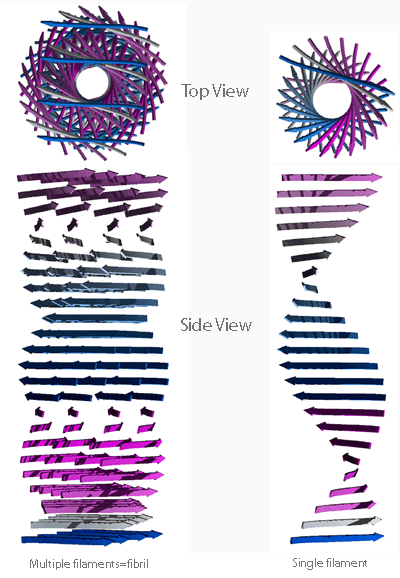
Despite the severe effects of protein aggregates on cells, sometimes these structures can have a beauty of their own. Above: Structure of an amyloid fibril formed from insoluble protein aggregates. Picture courtesy of Louise Serpell, Sussex University |
Proteins have very complex structures and have to fold correctly in order to stay in solution and work properly.
As an example, when an egg is heated, the liquid inside, which is mostly protein, solidifies and changes its
character. Proteins in the cells of our bodies are no different. All three of these diseases are have protein
misfolding and aggregation, that takes place over many years, and builds up. These aggregated proteins are
found in inclusion bodies that can occur inside and outside of the cells. When critical levels of aggregated
protein are reached, the cell dies.
|
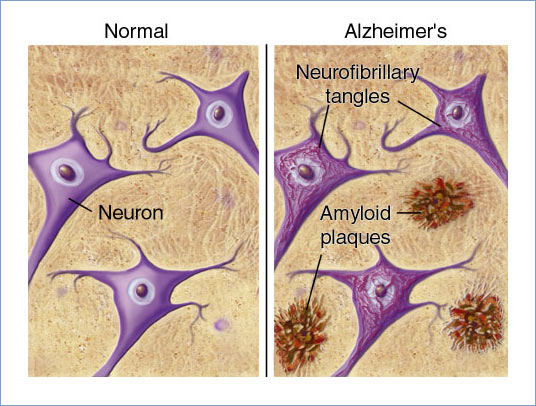
http://www.ahaf.org/alzdis/about/AmyloidPlaques.htm
Neurons do not easily regrow, so their loss slowly leads to devastating effects. People may suffer from loss of memory, mobility, independence and in most cases, the condition is fatal. |
Alzheimer's disease
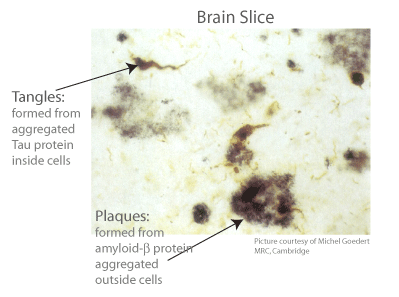 |
Symptoms: The main symptom of Alzheimer's disease is a progressive loss of memory and language impairment. These symptoms are mild at first but as the disease progresses, memory loss starts to interfere with everyday life. More recently acquired memories tend to be most readily lost. In a late stage of the disease people may forget how to do simple tasks, for instance brushing their teeth or combing their hair. Causes: While genetic mutations have been shown to directly cause a small proportion of Alzheimer's disease, the majority of cases have no known cause. Outside of cells there is the accumulation of an insoluble protein in plaques, beta-amyloid, that many believe is disease-causing. Also, another protein implicated in the disease is Tau, which is altered within cells and forms tangles.
|
The areas of the brain affected by Alzheimers are quite specific: those affecting memory and, to a lesser extent, language. Beta-amyloid and Tau are present throughout the brain, so why the area of effect is confined is unknown. Genetic factors have been shown to predispose to Alzheimer's disease, but, as with Parkinson's, environmental triggers may also play a major role. There is no cure available for Alzheimer's disease, although some drugs help ameliorate some of the memory deficits in early disease.
Image to the right of Alzheimer's plaque is found on the Zeiss website
Other links:
|
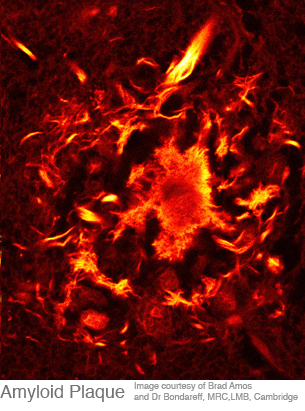 |
Parkinson's disease
|
Symptoms: Parkinson's disease is a movement disorder with a third of people also being demented and 40% having mood disturbances. Symptoms include difficulty in initiating movement, tremor, rigidity of mucles and associated fatigue.Causes: Cells in a part of the brain called the substantia nigra are necessary for the initiation of movement. These cells, which release a chemical messenger called dopamine, die. When this happens, it become difficult to convert the will to move to movement itself. Cell death is associated with the accumulation of an abnormal protein, alpha synuclein, in this region of the brain. This aggregation of alpha synuclein causes the formation of the characteristic Lewy bodies that are seen in the brains of people with Parkinson's disease. While the loss of neurons in relatively localised to the substantia nigra, the cognitive problems associated with this disease may arrise elsewhere, and the management of this, in many cases, is a major issue. Some treatment for the symptoms of Parkinson's disease are available. Drugs can be taken to increase the level of dopamine in the brain to compensate for the death of the neurons that normally produce it. Implantation of electrodes can be used to activate areas of the brain and is a useful treatment for tremor. Most cases of Parkinson's disease are not directly inherited; it is thought that a certain genetic make-up predisposes people to develop the disease if other factors are unfavourable.
|
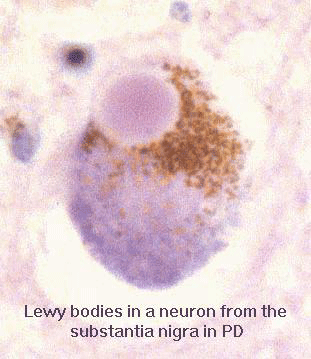 |
Huntington's disease
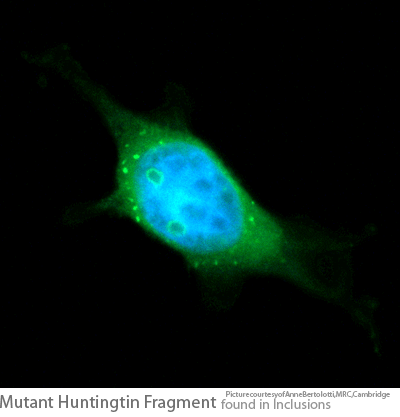
What happens in cells (above) versus what happens at the whole brain level (right).
|
Symptoms:
The symptoms of Huntington's disease include jerky, uncontrolled movements, difficulty in maintaining concentration,
slurred speech and problems swallowing, memory loss and mood changes, including depression and irritability.
Causes: Huntington's disease is caused by a mutation in the gene that codes for a protein called Huntingtin. The function of huntingtin is not understood. The mutation causes a chain of amino acids (polyglutamine) to be added to the protein. Over time, these mutant proteins aggregate in the cells and cause damage leading to cell death.
The length of the polyglutamine repeat determines the age of onset of the disease, and the problem can get worse with succeeding generations. The disease affects all areas of the brain but the basal ganglia and the frontal cortex are especially affected (movement and personality are affected greater than emotions).
It is possible to test to see if someone will develop Huntington's disease. Because Huntington's disease is a genetic disease that is inherited by 50% of the offspring of an affected parent and it is so very devastating, there are many ethical issues surrounding testing.
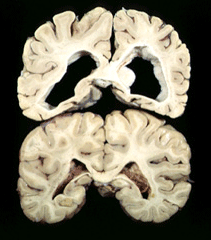
image from http://kobiljak.msu.edu/WebGraphics/Pathgraph/NP377c1.jpg |
Your work could explore the following:
The science behind the human condition
Cell death and brain disease; different areas of the brain have different function and not all areas of the brain are affected by any one disease
You might consider scientifically plausible means in which treatment of the future may come about
Back to 'Imagining The Brain' Home Page
Back to McMahon Home Page






